- Home
- Kathryn Lasky
The Last Girls of Pompeii Page 6
The Last Girls of Pompeii Read online
Page 6
“If you’re trying to appeal to my vanity, it won’t work,” Sura said stubbornly. Her eyes became stony and her angular jaw had a defiant set.
“Listen to me, Sura.” Bryzos leaned in close to his sister and took both of her hands again. “Look at that wall.” He nodded toward the wall by a table. “How many palm fronds do you count?”
Sura counted silently. “Fifteen. You have won a new one since last time I visited.”
“Yes, up the coast in Misenum. The admiral of the fleet, Pliny himself, presented me with it, and something else.” Bryzos got up and pulled his bed away from the wall. He took out a short knife and wedged it in between two bricks, which came loose, then reached his hand into a hole in the wall.
“Look at this!”
A pile of gold coins glittered in the palm of his hand. Sura gasped. “How did you get these?”
“Pliny gave them to me.”
“You have started to receive money for your wins?”
“Yes, and more.” He went to a cupboard, unlocked it with a key and took out an ornate sword inlaid with with precious stones. If gladiators were awarded the winning purse, even though they were slaves, they were permitted to keep it. The payment was established beforehand. The lanista of course got a cut. But when the combat had been particularly spectacular, the victor was often awarded something beyond the agreed upon amount, and the lanista had no claims on that additional award.
Sura turned the sword over in her hand. “This is amazing.”
“The jewels alone are worth eight thousand sesterces,” Bryzos said.
“Eight thousand! That’s almost half of what Herminia Petreia needs for the roof of the temple of Venus.”
“Exactly!” He bent down over his sister, who was sitting and took her face in his hands. “I am becoming a rich man. A few more contests and I shall be able to buy my freedom, and then I shall buy you from that disgusting man, Stephanus the fuller. You could stand him for a short time, couldn’t you Sura?”
“I suppose so. But what if he won’t sell me?”
“He’ll sell. Believe me that man has a reputation for greediness. Monumental greed. He is obsessed with money.”
“And young girls, I guess.”
“Don’t think about that.”
But Sura was not thinking about that. She was thinking about what would happen if Bryzos didn’t win. Then what were her hopes of freedom. Freedom? How curious, how bizarre that she had never even really thought about that word before, and here she had been a slave for almost twelve of her sixteen years.
On her way back to the home, Sura decided that she must go to the temple of Jupiter and make a sacrifice on the eve of the contest. If her brother was going to buy her back he was going o need a lot of money. But where could she get the money even to buy a chicken for the sacrifice? Perhaps Julia could get one for her. But then she would have to tell Julia the whole story. Or she could just say that she was worried about her brother fighting. Surely that would be enough.
By the time she settled onto her pallet at the foot of Julia’s bed, the town crier’s voice could be heard again announcing the first hour of the last segment of the night. Finis noctis diluculum! Finis noctis diluculum. One more hour until dawn. And then hora prima, the first hour of the day. Already she could hear the master’s clients gathering in the street at the door of the villa. The house had begun to stir. She looked up at Julia sleeping so peacefully. Her strange arm hung over the side of her bed. How awful that because of this arm her destiny was fixed. Perhaps she is no more free than I am.
Nine
JULIA STOOD ON A SMALL PEDESTAL as the seamstress draped the stola over her shoulder. The cloth was rich, richer than what she had worn for Flavia’s wedding, and she became suspicious. In the few days since the announcement of the date of Cornelia’s wedding, several things her mother had mentioned about her participation in the celebration—even the fact that an ornatrix would arrange her hair and not just the bride’s—had aroused her suspicions. But now this lavish cloth with the richly embroidered palla made her suddenly alert.
“Why so fancy?” Julia asked.
“My dear,” her mother replied, “I wanted it to be a surprise, but you are to be a bridesmaid for Cornelia.”
Julia was stunned. Usually only married women served as bridesmaids. “Does Cornelia know about this?”
“Of course. It was practically her idea.”
“Practically?” Julia said, and darted a fearful glance at Sura. Had Sura known about it? Sura shook her head.
“But what about Valeria? Valeria is Cornelia’s best friend.”
“Valeria will be Cornelia’s pronuba,” Herminia said. The pronuba, or third bridesmaid, was the most important. “And Flavia will be a bridemaid. But Cornelia really wanted you to be one, too.”
Julia’s suspicion deepened. “Why, because I shall never be a bride and never again be able to dress so richly?”
“Don’t be ridiculous. She wanted you because she loves you. She cares about you.”
This was such transparent nonsense that Julia did not even deign to answer. But she was wary. Some plot was being woven. A design was being put into motion. It was almost as if she could hear the first squeaking turns of the cogs.
The next day Julia’s wariness increased when it was announced that the family auspex would be paying a visit that morning and her presence would be required. Sura delivered this news.
“This is crazy Sura. Something’s up.”
“No, mistress. You mother says that it is required that the youngest bridesmaid meet with the family auspex before the wedding.”
“She just made that up. I never heard of Flavia’s youngest bridesmaid, Camilia, doing this when she got married. Camilia never came to meet with our auspex.”
“Well, maybe he went to her house instead,” Sura protested weakly. “Anyhow you are to go to the lararium immediately.”
Five minutes later Julia with Sura at her side, entered the lararium where the long-tme family auspex, Tiberius Calpurnius Maius, smiled benignly at her. Cornelia had already arrived and seemed to be regarding her with a look Julia had never seen before. Her oldest sister was studying her carefully. Was there almost a shadow of regret in her eyes, a hint of worry?
There was no chicken in sight, but Julia felt a cold fear begin to steal through her as she spied the circular woven container. Snakes, no! Julia hated snake offerings. She did not simply find them revolting. It was more complicated. Their eyes in particular, unlike those of chickens, seemed to possess a certain intelligence. Julia detested the way a dying snake’s eyes fastened onto you in the course of the sacrifice. It was as if they were reading you rather than the reverse. And Tiberius was so old and palsied he did not handle animals for sacrifices well. They wiggled around and often got away. He needed his attendants for anything larger than a chicken, like a ewe or a pig. But a snake! Why a snake? Julia had never heard of a snake being offered in connection with any wedding rituals.
On the morning of the wedding, the auspex came early and would perform the official sacrifice to the household gods. If the auspex deemed the entrails of the slaughtered animal favorable this signaled that the marriage ceremony could begin. But why, Julia wondered, was Tiberius here today? Was this really something to do with her being the youngest bridesmaid? He hadn’t come before Flavia’s wedding day. Why now? And who was the woman who stood in the shadows? A priestess, but not just any priestess. Her green stola and lighter green palla indicated that she was a damiatrix, a guardian of the temple of Damia. The worship of Damia—also called the Bona Dea or the Good Goddess of fruitfulness of both the earth and women and of healing—was considered a somewhat new religion in Pompeii. Her mother had nothing but disdain for these newer cults imported from the east, even though this one was closely associated with the worship of Venus.
The lives of the damiatrices were closely modeled after those of the vestal virgins in Rome. They rarely left the precincts of their temple, which was
on the outskirts of Pompeii. Virgin girls between the ages of eight and fourteen were chosen for service. The service of the damiatrix, like that of the vestals, lasted a period of thirty years, during which time they they were required to remain virgins and forbidden to marry. If they violated this pledge the punishment was the same as the one for the vestals—they would be buried alive. To have a daughter selected to be a damiatrix brought much honor to a family, just as it did to have a daughter chosen to be a vestal. Yet although it was associated with the healing arts and medicinal herbs, there was one aspect that Julia found absolutely loathsome: snakes, albeit harmless ones, were permitted to slither about freely within the confines of the temple.
“What’s she doing here?” Julia whispered to Sura.
“I have heard it is a recent practice. It is supposed to bring fruitfulness to the marriage.”
Julia shrugged. Her parents had not had a damiatrix anywhere in sight when Flavia had married. The only thing she could figure out was that their mother feared the date of August twenty-fourth, so she had decided that extra help was necessary.
The auspex came forward and kissed Julia on each cheek, another thing he had never done before. His breath smelled of garlic, and the stench of wine reeked from his pores. He was a drinker, there was no doubt about that. And at any wedding, by the middle of the feast he usually had to be removed by his attendants.
“Julia, my dear, how you have grown. A veritable young lady!” His face turned white and beads of perspiration stood out like dewdrops.
Tiberius began with an invocation to the family gods, the lares, and to the panates, the minor household gods who were responsible for keeping the larder full and free of vermin and minding the door of the villa. He then called for his attendants to come forth with the basket containing the snake. Tiberius nodded toward Julia. Her eyes opened wide.
“Me?” she murmured. But before she could reply, the damiatrix was by her side, and she felt her hand being taken by the slightly puffy and moist one of the woman in green. She slid her eyes to look at her. The woman stared forward and did not acknowledge Julia in any way except to continue holding her hand.
The lid of the woven box was opened and the old auspex reached inside and took out the snake. It was the most common kind used for readings. The snake, a fat old fellow who seemed more dead than alive, hung from Tiberius’s hand. One of the attendants handed the auspex the knife. The old man’s hands were trembling as he took it. Julia settled her eyes on the mask of her great-grandfather and prayed that that old Tiberius would make a quick business of it and not slice off his own hand in the process. But in the midst of her silent prayer, a sudden hissing cut like a blade through the air. And this time it was not the eyes of a dying snake that terrified Julia but those of a living one. The snake had coiled up around the auspex’s hand and was lashing out directly at Julia’s face. Its diamond head jabbed toward her as its forked tongue licked the air just inches from her eyes. There were screams, and Julia tried to step back, but the damiatrix had locked her forearm around Julia’s narrow chest, and she could not move either backward or to the side.
“Let me go!” Julia screamed, and wrenched herself free just as the head of the snake was sliced off.
“Don’t worry, dear,” the auspex was saying. “It meant nothing.”
Julia wheeled on the damiatrix. “But what did you mean?” She seethed. “Why were you holding me? What does all this mean to you?” Julia was enraged.
“It wasn’t a poisonous snake,” the damiatrix replied. “You were in no danger.”
“That’s not the point. It has fangs. They are sharp. Their tongues can hurt, and it was striking at me, right at me.”
“Oh no Julia,” her mother said soothingly. “You must be mistaken. it couldn’t have been striking at you. The snake was blind.”
Blind! The word exploded in her head. Blind, and yet it chose to strike at me. Was it an omen?. That was Julia’s last thought before she fainted.
Ten
WHEN JULIA REGAINED CONSCIOUS ness, she was in her bed. On one side of her was her mother, looking quite worried, and on the other side was Sura, who looked indescribably sad.
“Are you all right, dear?” Herminia asked.
“Not really,” Julia replied.
“It was just a ceremony that is done sometimes before a wedding—a new one I admit, but it is supposed to insure fertility.”
“Whose? Mine?” Julia’s mother gasped in dismay. “The snake seems to have confused the bridesmaid and the bride. And how come this was not done before Flavia’s wedding?”
“All the signs for Flavia were more propitious. You know the problems we have had with this date. It’s Mundus Patet, after all.”
“Well, I hope this does the trick for Cornelia, because it certainly scared me half out of my wits. I hope she has dozens of babies!” Julia spat the words. Every syllable was laden with disgust and scorn. To herself she thought, Dozens upon dozens of squalling, ugly, puking babies. And she hoped that Cornelia would get enormously fat in the process. She herself had had it with being the younger sister of brides. If she never saw a bride or a wedding again it would not be too soon.
Her mother stroked her forehead. “Now just rest dear. Sura will get you some wine.” Her mother kissed her and went through the door. Sura followed her to fetch the wine.
After they left, Julia began to suspect that what had transpired in the lararium had nothing to do with fertility or Cornelia and her marriage. A dark fear began to invade her. It spread until she felt far worse than she had when the snake had coiled and begun to strike out at her. Why had they brought a blind snake? Julia had never heard of a blind snake or any blind animal being used. The animals used by auspices and sibyls were all supposed to be perfect.
“I don’t want any wine!” she announced as Sura came through the door with the jug. “Just water.” Her mind needed to be clear. Julia knew that she had to think this through and could not let fear get the best of her. She looked up at Sura who still a look of profound sorrow. It struck her that that Sura had in fact looked this way for several days now, and she had simply not really been aware of it.
“Why are you looking that way, Sura?”
“What way, mistress?”
“You look sad and you look frightened.”
“It just gave me a scare with the snake, even though it was not a poisonous one. That’s all.”
“No that’s not all. You actually look more than frightened and sad, you look . . .” Julia’s searched for the word as she studied Sura’s face, “distrustful.”
“Distrustful, mistress?” This took Sura aback.
“Not distrustful of me. But you . . . you suspect something don’t you?”
“Oh no mistress. No. No.”
She is answering too quickly, Julia thought. Too quickly.
“Sura I don’t think that ridiculous ceremony had anything to do with Cornelia and her marriage. Have you ever heard of a blind snake or a blind anything being used by an auspex or a haruspex?” Her eyes drilled into Sura’s. A blade of sunlight pierced the slatted shutters and slid across Sura’s olive face as she looked down to the floor.
“No, mistress. Never.”
“What do you make of it?”
Sura hesitated, then sighed. “Slaves are not asked to make anything of anything. We do not have opinions, mistress.”
Julia jumped from her bed. “By Pollux that is not true, Sura. You know that as well as I do. We have shared everything. I ask you all the time what you think of this or that. I asked you what you thought of Cornelia’s fiancé Cassius, and you said you thought he was a bit arrogant—and not so bright, as well you said. All these years I have asked and you have told me what you thought.”
“Yes, mistress,” Sura answered, her eyes now filling with tears.
“What’s wrong? Why are you crying? And quit calling me mistress.” Julia’s voice suddenly softened. “Sura, you are my best friend. You know that. I have promised to fr
ee you when I grow up. What is wrong with you? It’s not just what happened in the lararium. You have been this way for days. Sad. So sad.” Julia paused. “You can’t say it is nothing. It is something. Can’t you tell me? I have told you that I don’t think that the ritual with the auspex had anything to do with the marriage of Cornelia. It was about me, wasn’t it?”
“Perhaps.”
Just perhaps? She knows more. Julia thought. “Tell me, did they open the snake and read the entrails after I fainted?”
“No Mistress, I mean Julia, no they did not.”
“See? So what was the point?”
Sura shook her head slowly, “I . . . don’t know.”
Julia really didn’t know what worried her more, Sura’s sadness or the mysterious ritual that had just taken place. It was all too odd. The sound of the cogs turning, the machinery of that fearful design, was becoming louder in her mind.
Eleven
“NO MOTHER, IT SIMPLY WON’T do,” Cornelia whined. “It must be a heavier fabric. Anyone can see through it in spite of all that embroidery. They’ll be able to see her arm. The cloth is almost transparent.”
“Cornelia,” Flavia barked. “That is so cruel. It doesn’t matter. The color becomes her. The drape is lovely. And it is such a beautiful cloth. Think of the money your father has spent on it. It can’t go to waste.”
“I’m sure I could use it. It could be part of my trousseau.”
Herminia squeezed her eyes shut as she spoke the next words. “You are so selfish.”
“No, Mother, I just want what’s mine.”
“This is not yours. This is the fabric picked out for Julia, and I won’t hear another word about it.”
Julia stood on a pedestal in her mother’s dressing room while the seamstress snipped and clipped the peach colored silk with its fine embroidery. Why do I have to be going through this! “Can I resign?” Julia asked suddenly.

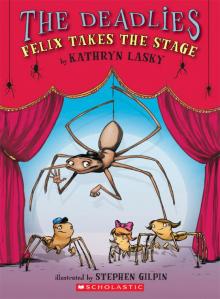 Felix Takes the Stage
Felix Takes the Stage Lucy
Lucy Lone Wolf
Lone Wolf Broken Song
Broken Song The Shattering
The Shattering The Crossing
The Crossing May
May Chasing Orion
Chasing Orion Star Rise
Star Rise The River of Wind
The River of Wind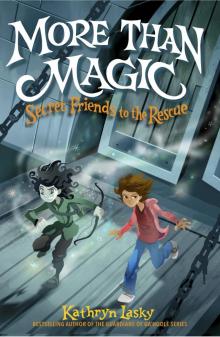 More Than Magic
More Than Magic Born to Rule
Born to Rule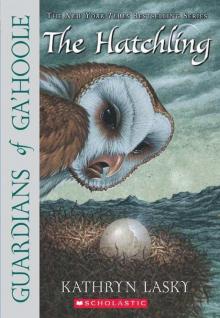 The Hatchling
The Hatchling The Rescue
The Rescue Marie Antoinette: Princess of Versailles, Austria - France, 1769
Marie Antoinette: Princess of Versailles, Austria - France, 1769 The War of the Ember
The War of the Ember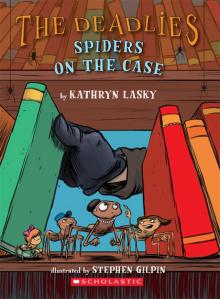 Spiders on the Case
Spiders on the Case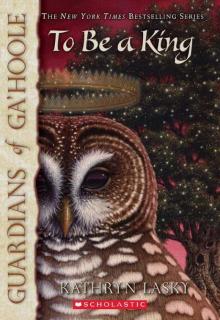 To Be a King
To Be a King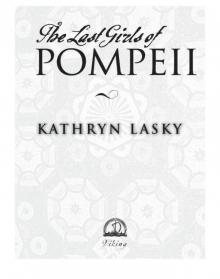 The Last Girls of Pompeii
The Last Girls of Pompeii The Outcast
The Outcast Exile
Exile Night Witches
Night Witches Spirit Wolf
Spirit Wolf The Quest of the Cubs
The Quest of the Cubs Frost Wolf
Frost Wolf The Keepers of the Keys
The Keepers of the Keys The Extra
The Extra Blood Secret
Blood Secret Watch Wolf
Watch Wolf Blazing West, the Journal of Augustus Pelletier, the Lewis and Clark Expedition
Blazing West, the Journal of Augustus Pelletier, the Lewis and Clark Expedition The Capture
The Capture The Burning
The Burning The Journey
The Journey Unicorns? Get Real!
Unicorns? Get Real! The Escape
The Escape Star Wolf
Star Wolf Ashes
Ashes Wild Blood
Wild Blood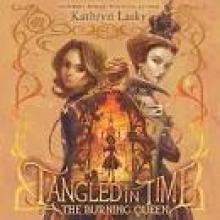 Tangled in Time 2
Tangled in Time 2 The Siege
The Siege Hannah
Hannah Elizabeth
Elizabeth A Journey to the New World
A Journey to the New World Christmas After All
Christmas After All Mary Queen of Scots
Mary Queen of Scots